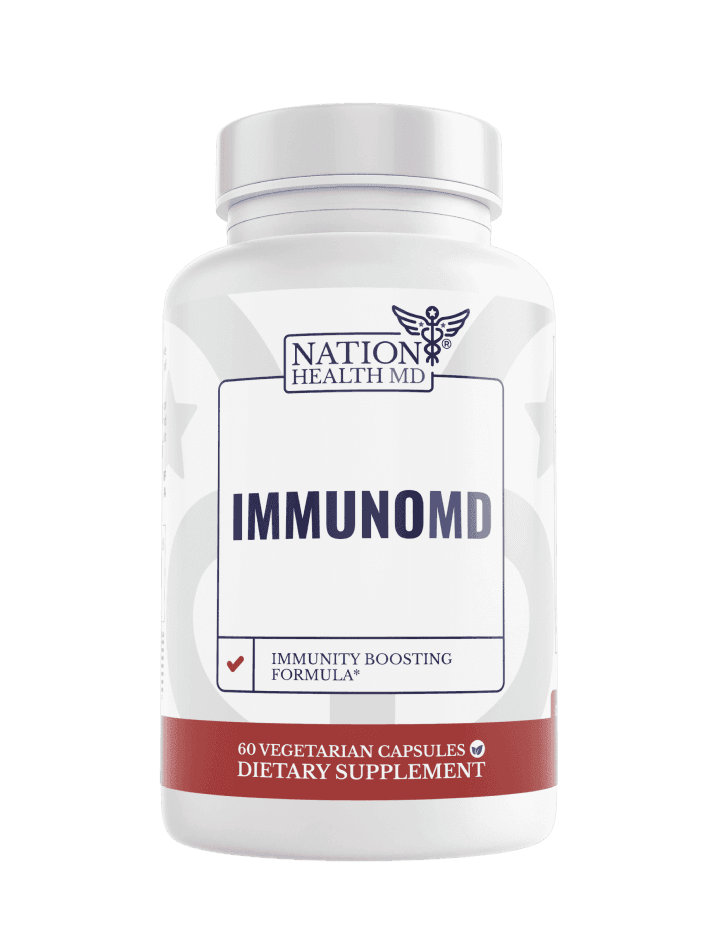Can Antibiotics Weaken Your Immune System?
Medically reviewed by our experts


Antibiotics rank among modern medicine’s greatest achievements, helping countless people overcome bacterial challenges. Yet many wonder: can antibiotics weaken your immune system?
These medications are important for treating infections. However, we are learning more about how they affect our body’s natural defenses. This article looks at how antibiotic use affects immune function. It provides a balanced view based on current research and practical tips for your wellbeing.
Key Article Findings
- Antibiotics can temporarily disrupt gut bacteria, which may affect certain immune responses for a limited time after treatment
- The microbiome typically begins recovering within days of completing antibiotics, with most immune functions returning to normal within weeks
- Supporting your body during and after antibiotics is important. Good nutrition, hydration, and healthy habits can help you stay well during treatment.
Understanding Antibiotics and Their Purpose
Antibiotics are substances that combat bacterial infections by either killing bacteria or stopping their growth. These powerful tools have changed healthcare since the early 20th century. They make once-deadly bacterial infections easier to manage.
Most antibiotic treatments work through several mechanisms:
- Disrupting bacterial cell walls
- Blocking protein production
- Interfering with DNA replication
Healthcare providers can prescribe narrow-spectrum antibiotics. These target specific types of bacteria.
They may also use broad-spectrum antibiotics. These affect a wider range of bacteria. This choice depends on the infection type and severity.
Many wonder: do antibiotics weaken immune system against viruses? It’s crucial to understand that antibiotics only work against bacteria, not viruses. This distinction explains why they help with strep throat but not the common cold.
Common situations requiring antibiotics include:
- Urinary tract infections
- Respiratory bacterial infections
- Skin infections
- Dental infections
Appropriate antibiotic use matters for both individual recovery and public health, as misuse contributes to bacteria developing resistance to these valuable medications.
The Human Microbiome and Immune Function
Your body hosts trillions of microorganisms collectively known as the microbiome. These tiny residents, particularly those in your digestive tract, play a surprising role in your overall health and immunity.
The gut microbiome consists of thousands of bacterial species that form a complex ecosystem. When balanced, these good bacteria contribute to your wellbeing in numerous ways beyond just digestion.
Research demonstrates that gut bacteria and immune function deeply interconnect. Up to 70% of your immune cells reside in the gut, creating a crucial hub for immune activity.
These beneficial microbes support your immunity by:
- Creating a barrier against harmful organisms
- Training immune cells to recognize threats
- Producing compounds that reduce inflammation
- Supporting the production of antibodies
Your microbiome begins developing at birth and continues to evolve throughout life. This system helps your body tell the difference between safe substances and possible threats. It prevents overreactions that could cause problems for your immune system.
The gut bacteria help you fight off unwanted challenges. They do this by making fatty acids that nourish the cells in your intestines. This strengthens your first line of defense and helps maintain the delicate balance needed for optimal immune response.
When this microbial community thrives, it contributes to both local gut immunity and your body’s overall defensive capabilities.
How Antibiotics Affect Gut Bacteria
Do antibiotics lower your immune system only? Antibiotics, while effective at eliminating harmful bacteria, can also impact the balance of gut bacteria. The primary way antibiotics affect the microbiome is by reducing the diversity of gut bacteria. Here’s a closer look at the effects:
- Reduction in diversity – Antibiotics can decrease the variety of beneficial gut bacteria, which may weaken immune function.
- Collateral damage – While antibiotics target harmful bacteria, they often unintentionally harm the “good” bacteria as well, disrupting the microbiome balance.
- Short-term effects – During a course of antibiotics, the gut microbiome undergoes rapid changes, with beneficial bacteria being reduced.
- Long-term effects – Some disruptions may persist after the course of antibiotics ends, leading to lasting impacts on gut health and immune function.
- Different antibiotics, different impacts – The type of antibiotic used plays a role in how much it affects gut bacteria. Broad-spectrum antibiotics tend to cause more significant changes compared to narrow-spectrum ones.
Research shows that the gut microbiome can start to recover after using antibiotics. However, the recovery time can vary. It depends on factors like the type of antibiotic, how long it is used, and individual responses. Some people may recover faster, while others may have longer-lasting effects on their gut bacteria. This can impact their overall immune function.
Research on Antibiotics and Immune Function
So, does antibiotics compromise your immune system based on research? Studies suggest temporary alterations rather than permanent damage.
Different research has examined how antibiotic treatments affect various immune components. One notable study found that certain antibiotics temporarily reduced the activity of neutrophils, important immune cells that help with fighting infections.
Laboratory investigations have demonstrated that:
- Some antibiotics may temporarily decrease the production of certain immune signaling molecules
- The communication network between gut bacteria and immune cells can be disrupted
- The body’s ability to recognize and respond to unfamiliar challenges may be temporarily altered
Recovery patterns vary based on:
- Type and duration of antibiotic used
- Individual factors like age and overall health
- Diversity of the original microbiome
Most research indicates that these changes are typically short-lived, with immune function returning to normal within weeks after completing treatment. However, repeated or prolonged courses may have more lasting effects on the microbial ecosystem that supports immunity.
Scientists continue investigating this relationship, particularly focusing on how different antibiotics affect specific immune pathways and how dietary approaches might support faster recovery of both microbiome and immune function.
The evidence suggests a nuanced picture – antibiotics remain essential tools against bacterial infections while potentially causing temporary changes to certain immune responses.
Antibiotics and Vulnerability to Other Challenges
Following antibiotic treatment, you might experience a temporary period of increased susceptibility to other challenges. This vulnerability stems from changes to your gut bacteria that can briefly affect how your body responds to new threats.
During this recovery window, which typically lasts from a few days to several weeks, your system works to reestablish microbial balance. The impact of antibiotics on this process varies based on:
- The specific medication used
- Treatment duration
- Your unique microbiome composition
- Overall health status
- Age and lifestyle factors
Research suggests this temporary disruption might affect your ability to fight certain challenges, particularly:
- Secondary bacterial challenges
- Some viral infections
- Digestive system irritants
Your recovery timeline depends on several factors:
- Most people begin rebuilding beneficial bacteria within days
- Diversity of gut bacteria may take 1-3 months to fully recover
- Specific beneficial species might take longer to return to previous levels
The good news is that for most people, this period of vulnerability is short-lived. Your body naturally works to restore balance, gradually rebuilding the microbial community that supports your overall wellness and fighting infections capability.
The Concern About Antibiotic Resistance
Antibiotic resistance represents a separate but related challenge to the topic of immune function. This occurs when bacteria evolve to survive exposure to medications designed to eliminate them.
Resistant bacteria develop through natural selection – when antibiotics kill susceptible bacteria, those with protective mutations survive and multiply. This process accelerates when antibiotics are:
- Used unnecessarily
- Not taken for the full prescribed duration
- Used at incorrect dosages
Each year, antibiotic-resistant infections affect millions worldwide, making previously treatable conditions difficult or impossible to address.
Unlike temporary effects on our immune system, resistance is about the bacteria themselves becoming stronger and more difficult to eliminate. This distinction is important – while your body recovers from antibiotic treatment, resistant bacteria continue to evolve and spread.
Supporting Your Body During and After Antibiotic Treatment
When antibiotics are necessary, there are several ways to support your body throughout the treatment process. Following these approaches may help maintain overall wellness while your system addresses the infection.
Nutrition plays a key role during antibiotic courses. Focus on:
- Colorful fruits and vegetables rich in plant compounds
- Adequate protein to support tissue repair
- Water to help your body process medications
- Soothing liquids like ginger tea, which is among best home remedies for swollen lymph nodes
After completing treatment, also consider incorporating fermented foods that contain beneficial bacteria, such as yogurt, kefir, or sauerkraut. These foods help replenish good bacteria in your gut. Fiber-rich foods like oats, beans, and apples serve as “food” for these beneficial microbes.
Lifestyle factors matter too. Quality sleep, movement, and managing daily tensions help maintain your body’s natural balance. Excessive stress – which some believe can stress cause swollen lymph nodes – may impact your recovery process.
Additional support may also be valuable. Immuno MD offers a thoughtfully crafted blend of nature’s most potent ingredients to help maintain your body’s balance. This premium formula combines the protective properties of Propolis, the antioxidant power of Vitamin C, and the traditional benefits of Elderberry.
These carefully selected ingredients work together to support your body’s natural functions and promote overall wellbeing. If you are recovering from antibiotics or want to stay healthy, Immuno MD can help. It provides your body with the support it needs to thrive.
Important: Complete your full course of antibiotics exactly as prescribed, even if you feel better sooner. This helps prevent bacterial resistance while ensuring the infection is fully addressed.
Conclusion
So, can antibiotics weaken your immune system? Research suggests they may temporarily alter certain immune responses by disrupting gut bacteria. However, these effects are typically short-lived, and antibiotics remain crucial tools for addressing bacterial infections.
The benefits of treating serious bacterial challenges generally outweigh these temporary effects. If you have concerns about antibiotics and your wellbeing, discuss them with your healthcare provider who can offer personalized guidance.
Research suggests antibiotics may temporarily increase susceptibility to viral challenges by disrupting beneficial gut bacteria that support immune function. This vulnerability typically lasts for a short period while your microbiome rebalances after treatment.
Most immune functions begin recovering within days after completing antibiotics. For most people, the microbiome and related immune responses return to normal within 1-3 months, though individual recovery times vary based on antibiotic type and personal factors.
Calcium supplements may reduce absorption of certain antibiotics. Iron supplements can interfere with some medications. Timing matters more than avoiding them completely – generally, take supplements at least 2 hours before or after antibiotics.
You may experience a brief period of increased vulnerability to other challenges after antibiotics due to temporary microbiome disruption. This doesn’t guarantee illness but may slightly increase susceptibility until your gut bacteria fully recover.
This requires healthcare provider guidance based on your specific situation. Factors include the type of infection, previous response, whether the prior infection fully resolved, and potential for developing resistance with repeated use.
Professional, C. C. M. (2025). Antibiotics. Cleveland Clinic.
Kohanski, M. A., et al. (2010). How antibiotics kill bacteria: from targets to networks. Nature Reviews Microbiology, 8(6), 423–435.
Our bacteria are more personal than we thought, Stanford Medicine-led study shows. (2024). News Center.
Wiertsema, S. P., et al. (2021). The Interplay between the Gut Microbiome and the Immune System in the Context of Infectious Diseases throughout Life and the Role of Nutrition in Optimizing Treatment Strategies. Nutrients, 13(3), 886.
Yang, I., et al. (2015). The infant microbiome. Nursing Research, 65(1), 76–88.
Warner, D. (2023). Do antibiotics harm healthy gut bacteria?
Becattini, S., Taur, Y., & Pamer, E. G. (2016). Antibiotic-Induced changes in the intestinal microbiota and disease. Trends in Molecular Medicine, 22(6), 458–478.
Ng, K. M., et al. (2019). Recovery of the Gut Microbiota after Antibiotics Depends on Host Diet, Community Context, and Environmental Reservoirs. Cell Host & Microbe, 26(5),
Zhao, A., Sun, J., & Liu, Y. (2023). Understanding bacterial biofilms: From definition to treatment strategies. Frontiers in Cellular and Infection Microbiology, 13.
Nwobodo, D. C., et al. (2022). Antibiotic resistance: The challenges and some emerging strategies for tackling a global menace. Journal of Clinical Laboratory Analysis, 36(9).
Robertson, R., PhD. (2023). What you should eat during and after antibiotics. Healthline.
Moore, A., & Khanna, D. (2023). The role of vitamin C in human immunity and its treatment potential against COVID-19: a review article. Cureus.
Elderberry: Health benefits, risks, uses, effectiveness. (n.d.). WebMD.
Popular Articles
Advertisement. This site offers health, wellness, fitness and nutritional information and is designed for educational purposes only. You should not rely on this information as a substitute for, nor does it replace, professional medical advice, diagnosis, or treatment. If you have any concerns or questions about your health, you should always consult with a physician or other health-care professional. Do not disregard, avoid or delay obtaining medical or health related advice from your health-care professional because of something you may have read on this site. The use of any information provided on this site is solely at your own risk.








